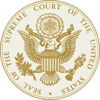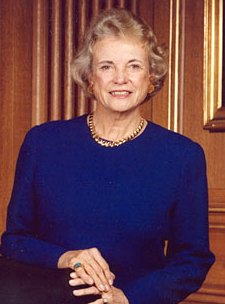|
United
States copyright law governs
the legally enforceable rights of creative and artistic works in the United
States. We are frequently accused of copyright infringement, where
in fact either no copyright exists in a work, or the use or review of
material is fair. The
following case precedent may be useful to persons thinking of
complaining to a publisher.
|
Feist
Publications, Inc.v. Rural Telephone Service Co.
|
|

Supreme
Court of the United States
|
|
Argued
January 9, 1991
Decided
March 27, 1991
|
|
Full
case name:
|
Feist
Publications, Inc. v. Rural Telephone Service Co., Inc.
|
|
Citations:
|
499
U.S. 340; 111 S. Ct. 1282; 113 L. Ed. 2d 358; 1991 U.S.
LEXIS 1856; 59 U.S.L.W. 4251; 18 U.S.P.Q.2D (BNA) 1275;
Copy. L. Rep. (CCH) P26,702; 68 Rad. Reg. 2d (P & F)
1513; 18 Media L. Rep. 1889; 121 P.U.R.4th 1; 91 Cal.
Daily Op. Service 2217; 91 Daily Journal DAR 3580
|
|
Prior
history:
|
Summary
judgment for plaintiff, 663 F. Supp. 214 (D. Kan. 1987);
affirmed, reported at 916 F.2d 718 (10th Cir. 1990);
affirmed, full opinion at 1990 U.S. App. LEXIS 25881
(10th Cir. 1990); cert. granted, 498 U.S. 808 (1990)
|
|
Subsequent
history:
|
|
|
|
Holding
|
|
A
telephone book did not satisfy the minimum originality required
by the Constitution to be eligible for copyright protection, and
effort and expenditure of resources are not protected by
copyright. Tenth Circuit Court of Appeals reversed.
|
|
Court
membership
|
|
Chief
Justice William H. Rehnquist
|
|
Associate
Justices Byron White, Thurgood Marshall, Harry
Blackmun, John Paul Stevens, Sandra Day O'Connor,
Antonin Scalia, Anthony Kennedy, David Souter
|
|
|
Case
opinions
|
|
Majority
by: O'Connor
|
|
Joined
by: Rehnquist, White, Marshall, Stevens, Scalia,
Kennedy, Souter
|
|
Concurrence
by: Blackmun
|
|
|
Laws
applied
|
|
U.S.
Const. Art. I
|
FEIST
PUBLICATIONS v. RURAL TELEPHONE SERVICE
Feist
Publications, Inc., v. Rural Telephone Service Co., 499 U.S. 340
(1991), commonly called just Feist v. Rural, was a United
States Supreme Court case in which Feist copied information from
Rural's telephone
listings to include in its own, after Rural refused to license the
information. Rural sued for copyright
infringement. The Court ruled that information contained in Rural's
phone directory was not copyrightable, and that therefore no
infringement existed.
Background
Rural
Telephone Service Company, Inc. was a telephone provider for areas in
north-west Kansas. The company was under a statutory obligation to
compile a phone directory of all their customers free of charge as
condition to their monopoly franchise.
Feist
Publications, Inc. specialized in compiling telephone directories from
larger geographic areas than Rural. They had licenced the directory of
11 other local directories with Rural being the only hold-out in the
region. Feist went ahead and copied some 4000 entries from Rural's
directory. Rural, however, had placed a small number of phony entries to
detect copying and caught Feist.
Prior
to this case, the subsistence of copyright in United States law followed
the sweat of the brow doctrine that gave copyright to anyone who
invested significant amount of time and energy into their work. At trial
and appeal level the courts followed this doctrine siding for Rural.
Ruling
of the Court
The
unanimous ruling of the Court was given by Justice O'Connor. In this she
examines the purpose of copyright and proposes a new standard for
subsistance of copyright based on originality.
It
is a long-standing principle of United States copyright law that
"information" is not copyrightable, O'Connor notes, but
"collections" of information can be. Rural claimed a
collection copyright in its directory. The court clarified that the
intent of copyright law was not, as claimed by Rural and some lower
courts, to reward the efforts of persons collecting information, but
rather "to promote the Progress of Science and useful Arts"
(U.S. Const. 1.8.8), that is, to encourage creative expression.
Since
facts are purely copied from the world around us, O'Connor concludes,
"the sine qua non of copyright is originality". However, the
standard for creativity is extremely low. It need not be novel, rather
it only needs to possess a "spark" or "minimal
degree" of creativity to be protected by copyright.
In
regard to collections of facts, O'Connor states that copyright can only
apply to the creative aspects of collection: the creative choice of what
data to include or exclude, the order and style in which the information
is presented, etc., but not on the information itself. If Feist were to
take the directory and rearrange them it would destroy the copyright
owned in the data.
The
court ruled that Rural's directory was nothing more than an alphabetic
list of all subscribers to its service, which it was required to compile
under law, and that no creative expression was involved. The fact that
Rural spent considerable time and money collecting the data was
irrelevant to copyright law, and Rural's copyright claim was dismissed.

Justice
Sandra O'Connor
Implications
The
ruling has major implications for any project that serves as a
collection of knowledge. Information (that is facts, discoveries, etc.),
from any source, is fair game, but cannot contain any of the
"expressive" content added by the source author. That includes
not only the author's own comments, but also his choice of which facts
to cover, his choice of which links to make among the bits of
information, his order of presentation (unless it is something obvious
like an alphabetical list), any evaluations he may have made about the
quality of various pieces of information, or anything else that might be
considered "original creative work" of the author rather than
mere facts.
For
example, a recipe is a process, and not copyrightable, but the words
used to describe it are; see Publications Int'l v Meredith Corp.,
88 F.3d 473 (7th Cir. 1996). Therefore, you can rewrite a recipe in your
own words and publish it without infringing copyrights. But if you
rewrote every recipe from a particular cookbook, you might still be
found to have infringed the author's copyright in the choice of recipes
and their "coordination" and "presentation", even if
you used different words, though the West decisions below suggest that
this is unlikely unless there is some significant creativity in the
presentation.
The
text of US Laws is in the public domain, but Thomson West claims a
copyright on the page numbers in its printed edition of those laws. By
this reasoning, you could refer to a law or even include large excerpts
with impunity, but if you reproduce it in such a way as to deliberately
preserve West's page numbers, you might be in trouble. This copyright
claim has been defeated in two court cases [1].
West v. Mead[2]
(No. 85-5399 799 F.2d 1219)(1986) and Matthew Bender & Company,
Inc., & Hyperlaw, Inc., vs. West Publishing Co (No. 97-7430).
The
West claim of originality in the way it presented its reports of
decisions has also been found to be uncreative and therefore not
copyrightable, in Matthew Bender v. West Publishing Co. (158 F.3d
674) [3]
(may be known as Hyperlaw, Inc. v. West Publishing Company, 94
Civ. 589 (SDNY 1997)).
Another
case covering this area is Assessment Technologies v. WIREdata [4],
which ruled that a copyright holder in a compilation of public domain
data cannot use that copyright to prevent others from using the
underlying public domain data, but may only restrict the specific format
of the compilation, if that format is itself sufficiently creative.
In
the late 1990s, Congress attempted to pass laws which would protect
collections of data, but these measures failed. By contrast, the European
Union has a sui generis (specific to that type of work) intellectual
property protection for collections of data.
Other
countries
The
subsistance of copyright in phone directories have come up in several
other countries.
In
Canada, the appeal-level case of Tele-Direct (Publications) Inc. v.
American Business Informations Inc. (1997) 76 C.P.R. (3d) 296 (F.C.A.)
reached a similar result to that of Feist. However, the Supreme Court
backed away from the originality doctrine in CCH Canadian Ltd. v. Law
Society of Upper Canada.
In
Australia, the Federal Court decision of Desktop Marketing Systems
Pty Ltd v Telstra [2002] FCAFC 112 followed the UK approach in
Walter v. Lane and ruled that subsistance in copyright did in-fact
follow the "sweat of the brow" doctrine.
Relation
with treaties
Congress
has been considering whether to implement a treaty negotiated at the
World Trade Organization. Part of the Uruguay Round Agreement resulted
in text which states, in Part II, Section 1, Article 10:
-
Compilations
of data or other material, whether in machine readable or other
form, which by reason of the selection or arrangement of their
contents constitute intellectual creations shall be protected as
such. Such protection, which shall not extend to the data or
material itself, shall be without prejudice to any copyright
subsisting in the data or material itself.
-
The
text mirrors that of Article 2(5) of the Berne Convention, which applies
to "collections of literary or artistic works".
This
treaty provision is broadly in line with the United States Copyright Act
and the Act's case law, which protects compilations of data whose
"selection and arrangement" is sufficiently original. See
17 U.S.C. § 101 ("compilation" as defined by the United
States Copyright Act includes compilations of data). The standard for
such originality is fairly low; for example, business listings have been
found to meet this standard when deciding which companies should be
listed and categorizing those companies required some kind of expert
judgement. See Key Publ'ns, Inc. v. Chinatown Today Pub. Enters.,
945 F.2d 509 (2d Cir. 1991) (applying Feist). As such,
implementation of this treaty would not overrule Feist.
REFERENCES and LINKS:
A
taste for adventure capitalists

Solar
Cola - a healthier alternative
|

